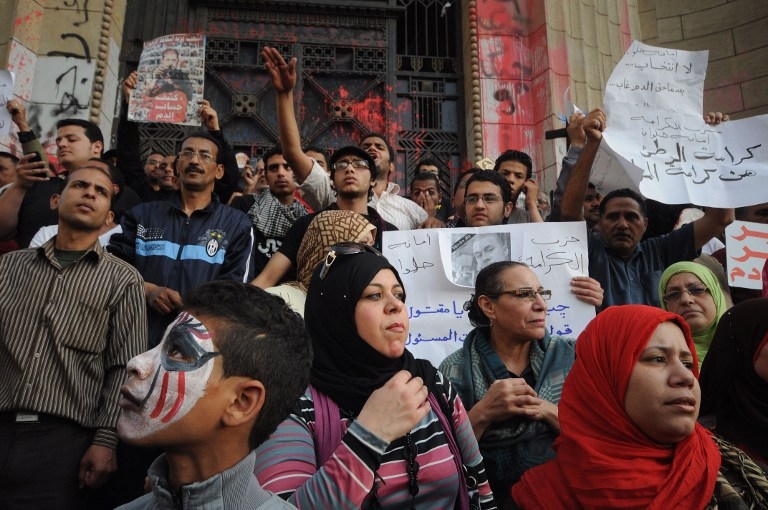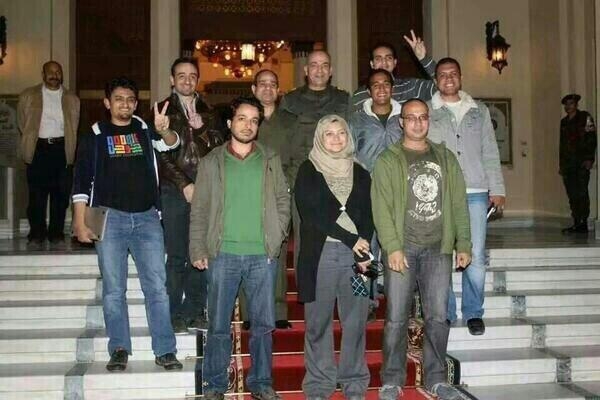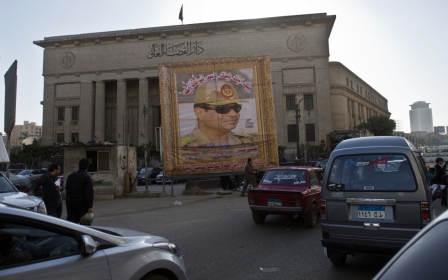April 6 movement defiant after court ban

On Monday, the Egyptian Court for Urgent Matters banned the April 6 youth movement, a protest group founded in 2008 in support of a general strike in the industrial city of Mahalla. The ruling, similar to the banning of the Muslim Brotherhood on 23 September 2013, will allow the government to confiscate April 6 property and freezes the movement’s assets. The problem, Ramy Sayed, mobilization coordinator for April 6 says, “We don’t have any place, any apartment or offices, we don’t have funding, so how can they close us?”
Started on a Facebook page in 2008, April 6 was one of Egypt’s first movements to organize protests through social media. Within several weeks of its inception, the group had reached an audience of over 50,000, and became one of Egypt’s largest opposition networks. From then until the beginning of the 2011 revolution, Ahmed Maher, one of the original moderators and architects of the movement, along with others honed April 6's tactics through street protests and meetings. They studied non-violent civil disobedience strategies, traveling to Serbia to learn from the revolutionary groups there.
Several years of police raids and interrogations stymied the group’s activities and drove organizers underground. Partly inspired by Tunisia’s revolution, in 2011, April 6 began planning a protest against the Mubarak regime’s staid policies, for 25 January, Egypt’s National Police Day. On that day, members of the group joined in Tahrir Square, alongside hundreds of supporters, ostensibly starting Egypt’s revolution.
Throughout the revolution, April 6 provided logistical and moral support to weary protestors, leading chants, organizing marches and supplies for the sit ins. Despite its strength 6 April began to fray under the pressures of leadership and unclear goals. In a cable leaked by Wikileaks, embassy staff from the US Embassy in Cairo wrote, “April 6's stated goal of replacing the current regime with a parliamentary democracy prior to the 2011 presidential elections is highly unrealistic, and is not supported by the mainstream opposition.”
In the summer of 2013, April 6 pledged support for the Tamarod or “Rebel” campaign, a then nascent countrywide petition to oust former president Mohamed Morsi.
After Morsi’s deposal, April 6 began to fracture from Tamarod, when the campaign’s spokesperson Mahmoud Badr, made several inflammatory remarks aligning the conglomeration of human rights and protest movements with the military’s heavy handed crackdown. Members of 6 April formed another protest group, Third Square, in opposition of both the Muslim Brotherhood and military rule.
Egypt’s interim president Adly Mansour approved Egypt’s controversial Protest Law on 24 November 2013, which restricts the freedom of protest, forcing any legal form of organization to be registered with local police beforehand. This has since become a major focus of April 6’s political activity.
On 26 November, activists and supporters gathered at Cairo’s Shura Council to protest the law. The protest was violently dispersed, and the following day a warrant for Ahmed Maher’s arrest was filed. Now, he is in prison, facing a three-year sentence and a LE 50,000 fine, alongside with fellow April 6 member, Mohamed Adel, and activist Ahmed Douma.
Lawyers and April 6 members explained that the verdict was in line and with the country’s burgeoning culture of government collusion between Egypt’s legal system and the military regime. “The government created this political atmosphere where a normal citizen would do that. This is all a part of a bigger policy to attack these oppositionists” said Abdelghany Sayed, a lawyer and international law researcher.
The verdict comes in a recent spate of controversial lawsuits brought against Egyptian civilians accused of political violence. As The Middle East Eye previously reported, 42 Egyptians face charges for murdering a single Cairo University student during clashes between students and police officers. On 24 March 2014, 529 prisoners were accused of being Muslim Brotherhood members and sentenced to death over the killing of one police officer during a riot in Minya. On Monday, Minya’s courts sentenced another 683 defendants to death, the biggest death sentence in Egypt’s legal history. “We think it is a political judgment by the regime against the April 6 movement. The regime found the activity in the last 6 months was too revolutionary” Ramy Sayed said.
“There has been an escalation against the movement since the army started to really take over after Rabaa and Nahda”, Abdelghany said. Now, another lawyer who preferred to remain anonymous explained, political cases, unlike criminal ones, are treated extra judicially; outside of Egypt’s written code of law. “Look, it is a clash against anti revolution and the revolution. Egypt wants to destroy every movement, every party who contributed to the revolution”, Ramy said.
The Lawsuit filed by Lawyer Ashraf Saeed accuses the movement of a litany of bombastic charges, including “cooperating with the US and taking funding from the government” according to Abdelghany. The lawsuit cites illegally recorded phone conversations that were anonymously leaked to Abdel-Rehim Ali, an Egyptian television presenter who host’s a show called 'Black Box'. In several episodes, Ali illegally aired private phone calls of prominent activists, including Maher, talking about organizing protests and other political activities, in an apparent attempt to portray them as counter state actors.
According to the lawyers the prosecution’s accusations were long, rambling, and thin. “They made a long list of accusations, this member was in this demonstration, that member was in that demonstration”, Abdelghany said. “There is no solid accusations against any of the members,” he added. The defense accused the April 6 movement of contact with armed militants after a member was seen at a protest in Gaza during the bombings of 2008, he explained. “The court’s decision is just made for the media, it’s not legal, it's political, without solid virtue from an article in the penal code” Abdelghany said.
In all cases, defendants have the chance to repeal the verdict and death sentences have to be approved by the Grand Mufti of Al Azhar. Death penalty cases are often denied, but all defendants remain in prison under detention, which can last indefinitely according to the lawyer.
“[The case is] worrying because it signifies how judges are effected by the general political ambiance, and how Egyptian politics have begun to leak into the judiciary,” Abdeghany said.
Despite legal setbacks, April 6 members remain resilient. “We have many files and things to do and we will continue to do protest in the street. We will continue to protest against the protest law,” Ramy said. “We will continue until they stop the protest law and release every activist. We don’t care about this ruling because it is a fake trial,” he added.
Young Egyptians like Amin Mohamed, a student at Helwan University, felt dejected by the ruling, “what can I do, this is what it is now?” He asked. Others, like Ahmed Hamdi, a vegetable seller in Cairo’s working class district of Shubra, supported the court’s decision, “If they said it, it must be true. They deserve what they got”. Mazen Hamza, a former member of the April 6 movement, was less ambivalent in his feelings on the verdict. “Welcome to the fascist state,” he charged.
Middle East Eye propose une couverture et une analyse indépendantes et incomparables du Moyen-Orient, de l’Afrique du Nord et d’autres régions du monde. Pour en savoir plus sur la reprise de ce contenu et les frais qui s’appliquent, veuillez remplir ce formulaire [en anglais]. Pour en savoir plus sur MEE, cliquez ici [en anglais].



